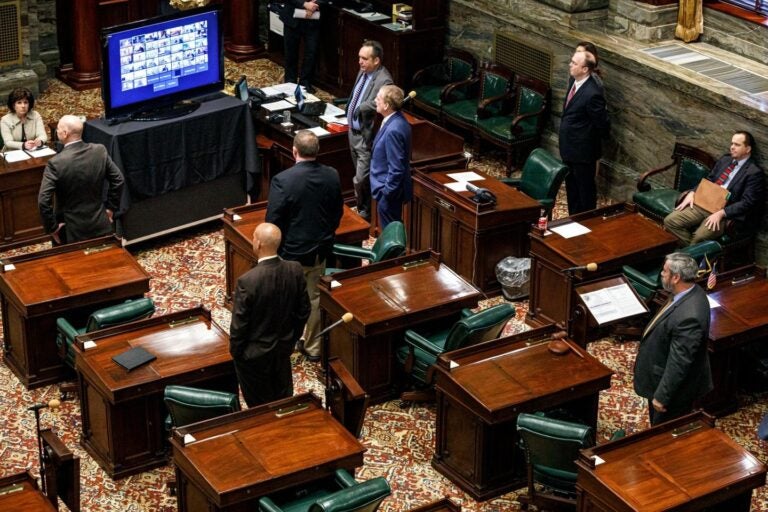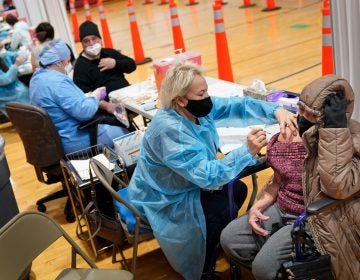Gov. Tom Wolf will veto bill to reopen more Pa. businesses, as top health official warns legislation puts ‘more lives at risk’
Republicans say they can safely reopen parts of the economy, while Democrats say the effort is premature.

(Dan Gleiter/The Patriot News)
This story was produced as part of a joint effort among Spotlight PA, LNP Media Group, PennLive, PA Post, and WITF to cover how Pennsylvania state government is responding to the coronavirus. Sign up for Spotlight PA’s newsletter.
Gov. Tom Wolf will veto a bill that would have allowed a significant number of businesses across the state to reopen, which Republicans passed despite the state’s top health official warning the move would put “more lives at risk.”
GOP lawmakers do not have enough votes to override his veto.
“As the administration has stated many times, irresponsibly going against the direction of the secretary of health and reopening businesses too early will only extend the length of the economic hardships created by the pandemic,” Wolf spokesperson Lyndsay Kensinger said in an email.
The legislation, which garnered final approval from the Senate along party lines, would redefine essential businesses and provide a road map for employers to reopen as long as they take certain safety precautions as defined by the Centers for Disease Control and Prevention.
Those changes would allow most construction projects to proceed, and companies that did not receive a waiver but fall under federal Cybersecurity and Infrastructure Security Agency guidelines, to reopen.
Democrats decried the legislation as premature and unsafe, since the state lacks adequate testing and personal protective equipment for front-line workers. The bill also runs counter to state and federal health experts who say a number of safety measures — including greatly increased testing and contact tracing — must be in place before a reopening.
There is not a robust system for either of those things in Pennsylvania.
In March, Wolf closed all but “life-sustaining” businesses as the coronavirus spread across the state, shutting down a large swath of the economy. In response to initial criticism, the administration opened a waiver process for businesses not considered essential. Those decisions, however, were made in secret and have been criticized as inconsistent and unfair.
The Republican majority as well as some Democrats have grown frustrated with that waiver process, in part because of claims that it has allowed big-box stores to remain open while forcing small businesses with to shutter.
Senate Majority Leader Jake Corman (R., Centre) cited the waiver process and the administration’s refusal to release information about how those waivers were granted or denied, and who received them, as motivation for passing the measure.
“This process has failed,” Corman said. “It has not been transparent or consistent. What we’re trying to accomplish is to set a standard, a nationally recognized health standard, about what can be open and what cannot be open.”
In a letter to the legislature sent last week, Secretary of Health Rachel Levine advised lawmakers against broadening guidelines for what constitutes an essential business, and said it would have a “devastating impact” on public health in the state.
“Encouraging increased social movement of Pennsylvanians at this time by reopening a significant amount of businesses would be reckless and irresponsible,” Levine said in the letter. “The decision to shutter non-life sustaining businesses that support families across this commonwealth was a painful one, but before we can save livelihoods we must save lives.”
The House passed the bill Tuesday mostly along party lines, with Democratic members attempting to add personal protective equipment, hazard pay, and workers’ compensation amendments, which a Republican leader said would be “taken up in subsequent bills.”
The Senate on Wednesday also passed a bill that would create a “cost and recovery” task force made up of members from each branch of government. Republican lawmakers amended the legislation to allow each county to create its own plan to reopen local economies, meaning the bill needs to return to the House. Democrats opposed the plan.
Senate Minority Leader Jay Costa (D., Allegheny) said the state is not yet prepared to handle the surge of COVID-19 cases that could arrive if businesses begin to open.
“These decisions should be made by health professionals, not by county executives,” he said. “It is not safe to reopen businesses when we do not have widespread testing” or personal protective equipment.
The passage of the legislation illustrates a growing divide on how the state should respond to the coronavirus pandemic.
Republicans say they are attempting to clean up what they see as a flawed waiver process while protecting public health and the economy at the same time. Democrats see these efforts to reopen businesses — against Levine and other health experts’ advice — as premature and fear they will end up endangering workers who will be forced to go back to work.
Wolf this week joined a coalition of East Coast governors in forming a pact to determine how to safely reopen the states’ economies. On Wednesday, he defended his decision-making on closures and the waiver process.
“Unlike other states in the nation, we’re not just handing out a list and saying, this is the way it is,” he said during a daily briefing. “We’re trying to do everything we can to make sure that we are keeping Pennsylvanians safe. We’re doing that by staying home and making sure the businesses that remain open are absolutely essential.”
 100% ESSENTIAL: Spotlight PA provides its journalism at no cost to newsrooms across the state as a public good to keep our communities informed and thriving. If you value this service, please give a gift today at spotlightpa.org/donate.
100% ESSENTIAL: Spotlight PA provides its journalism at no cost to newsrooms across the state as a public good to keep our communities informed and thriving. If you value this service, please give a gift today at spotlightpa.org/donate.
WHYY is your source for fact-based, in-depth journalism and information. As a nonprofit organization, we rely on financial support from readers like you. Please give today.


![CoronavirusPandemic_1024x512[1]](https://whyy.org/wp-content/uploads/2020/03/CoronavirusPandemic_1024x5121-300x150.jpg)


